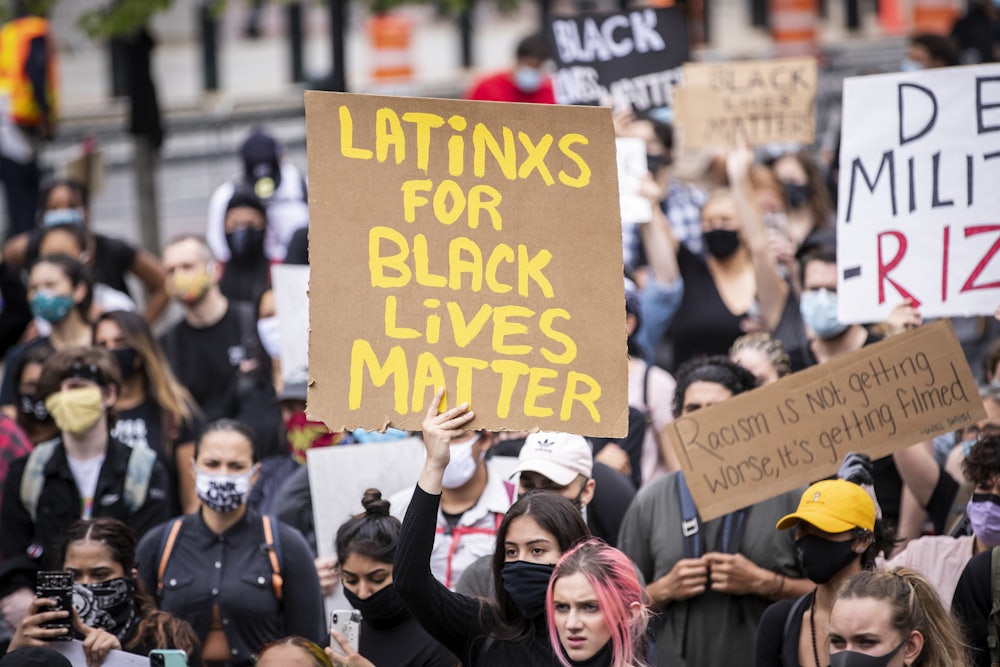Every journalist knows how important words are. Neglecting to put “alleged” in front of certain statements opens you up to lawsuits, incorrectly paraphrasing someone turns you into a liar, failing to properly cite your sources might get you fired. Word choice is such a sensitive issue that newsrooms don’t leave the matter up to individual writers and editors; instead they pour resources into composing “style guides” that answer every usage question anyone could have: whether women are “actors” or “actresses,” whether “internet” is capitalized, whether the Oxford comma should be used. They’ll usually tell you if you can curse or not too.
They’re helpful documents, and putting one together is surprisingly difficult, even if you’re mostly cribbing from the Associated Press or Chicago Manual of Style. You inevitably have to pick a side in more than a few culture-war issues: Can “they” be singular to avoid using gendered language? Is “Latinx” useful in some circumstances, or should you use “Latino” instead? Should you avoid referring to people who get abortions as “women”? Even when an outlet is covering a topic far removed from what we generally think of as politics, you can see ideological fingerprints in their style guides—whether they refer to “managers” rather than “owners” of fantasy sports teams, or whether they discuss “primary bedrooms” and not “master bedrooms.”
Language has always evolved in tandem with shifting social mores, and which words are regarded as offensive naturally changes over time. But it seems like there’s been an acceleration in this process in recent years, as academics, newsrooms, and communications professionals reconsider their word choices. This might have something to do with the way the internet speeds the spread of ideas: It’s trivially easy for any journalist to find resources for appropriate terms to use when writing about homelessness, disabilities, or a host of other topics. Social media has also increased the penalty for looking insensitive. There have been dozens if not hundreds of Notes app apologies from celebrities that go something like, “Years ago in an interview I used a term that I did not realize was a slur denigrating the Roma Community, who have a Proud and Complex culture. I now understand that this was Hurtful. I am Listening [ear emoji] and Learning [book emoji].”
But I suspect that this fixation on words comes at least partially out of the belief that language can sometimes be so hurtful that it’s akin to physical harm. If our words can literally cause pain, then of course we should choose them with special care. Suppressing certain phrases or changing the offensive names of schools and sports teams could be a form of healing. Land acknowledgments can be powerful reminders of the peoples harmed by colonialism. When we pay attention to the words we use, we are protecting the marginalized and being virtuous fellow human beings.
There’s usually quite a lot of thought behind what might seem at first glance like odd feats of linguistic contortion. One recent example: When many House Democrats and their aides marched on the Senate to protest the coming reversal of Roe v. Wade, they chanted, “My body, my decision”—a tweaked version of the iconic abortion rights chant “My body, my choice.”
“Choice” was a no-no, as one Democratic political consultant explained to Slate: “If you look at the way that choice occurs in common speech.… It tends to co-occur with consumer things. So vanilla or chocolate, decaf or caf. We tend to use the word choice in situations in which we’re making inconsequential decisions without much deliberate thought.” Saying “pro-choice” posits abortion as an individual action, rather than holding up the right to legal abortion as “what a forward-looking country has and does.” The consultant doesn’t offer an alternative to “pro-choice,” but a Planned Parenthood Action blog post that has a slightly different gripe with “choice” favors saying “pro-abortion”:
Well-meaning folks often contrast “pro-choice” with “pro-abortion,” as in, I’m pro-choice, not pro-abortion. But that’s hurtful to people who’ve had abortions. It implies that abortion isn’t a good thing, that legal abortion is important but somehow bad, undesirable. That’s deeply stigmatizing, and contributes to the shame and silence around abortion, making people who’ve had abortions feel isolated and ashamed.
Clearly, influential people within the reproductive rights movement agree more or less with this logic—“choice” is insufficiently progressive. But this conflicts with politicians’ natural desire not to go around chanting that they’re “pro-abortion.” Very few people are willing to go so far as the D.C.-area band Copstabber, the songsters behind “More Abortions.” So very tuned-in progressives have sort of found a middle ground and landed on “decision,” which is, as far as I can tell, a synonym for “choice.”
This is Style Guide Liberalism: a fixation on terms and language that is well-intentioned but inevitably creates a murky layer of jargon between speaker and listener, writer and reader. However egalitarian its aims, it inevitably results in an in-group and out-group. By avoiding “choice,” advocates may be pushing the reproductive rights movement in a less individualistic, more equitable direction. Unavoidably, though, when you say “decision” instead, you are also signaling to everyone that you are plugged-in enough to know that we’re not saying “choice” anymore.
Highly educated people in the bubble know their way around jargon. They’re used to adapting to new ways of speaking and writing; at every new job they’ve likely had to internalize a fresh lineup of buzzwords and acronyms, a set of tools that allows them to demonstrate their knowledgeability without having to know anything. When they got wind that everyone was putting pronouns in their email signatures and saying “Latinx,” they got with the program easily. They know language is powerful and important, and they know that buzzwords impart a kind of insider status to those who can wield them confidently.
This process isn’t what the progressives who promulgate more inclusive forms of speech had in mind. In a Vox explainer on “BIPOC”—a contentious term that stands for “Black, Indigenous people of color” or “Black, Indigenous, and people of color” depending on who you ask—a linguistic student despairs at (white) people who don’t “do a little research” into “the different semantic valences of a particular term” in order to figure out whether to use it. Instead, the linguist says, “people generally go, ‘Tell me the word, and I will use the word.’ They’re not interested in learning things about the history of the term.”
Let’s set aside the question of how deeply we can expect the average person to dive into left-wing linguistics. The point is that whatever radical politics are meant to be manifested by using “BIPOC” or other left-wing terms, inevitably these words are just co-opted by well-meaning white people who live in terror of offending anyone at any time. In particular, these words get co-opted by corporate communications professionals who are tasked with maintaining DEI and ESG standards at the mayo brand that pays their salary.
Within the progressive movement—and among the groups these words refer to—these new terms are controversial. New York Representative Alexandria Ocasio-Cortez uses “Latinx,” as does the social justice nonprofit Mijente, but Arizona Representative Ruben Gallego (a fairly progressive Democrat) has said that “when Latino politicos use the term, it is largely to appease white rich progressives who think that is the term we use.” Polling has found that only a tiny minority of Hispanic or Latino Americans use “Latinx”; a majority of them simply don’t care about terminology. There are similar debates around “BIPOC,” a term that one poll found was unknown to 63 percent of Americans.
While most people greet these arguments over terminology with a blank stare, corporations love Style Guide Liberalism. They love it for the same reason wealthy white liberals love it: It costs them nothing to use the “right” words. So you get Microsoft doing a land acknowledgment at the company’s 2021 Ignite conference. Or you get Starbucks a few years back encouraging its workers (whom it calls “partners”) to talk to customers (“guests”) about race. Or hundreds of corporate in-house content teams churning out articles about how they are celebrating the months that honor AAPI heritage, Hispanic heritage, LGBTQ heritage, etc.
I assume that some of my comrades who are toiling away writing up reports on the Altria Inclusion Initiative, or whatever, genuinely believe that they are fighting to dismantle the legacy of patriarchal white supremacy. Sometimes these efforts, though, read like the product of the P.R. groupthink that pervades the corporate and high-level nonprofit world. This results in transparently bullshit nonsense like the Microsoft land acknowledgment or headlines referring to “Latinx women” or the San Francisco Unified School District banning the use of the word “chief” in job titles on the grounds that this was offensive to Indigenous people.
Sometimes this stuff is criticized as being the product of progressive overreach, a.k.a. the old “political correctness gone mad” trope. But Style Guide Liberalism is only loosely connected to progressive politics. Really, it’s an expression of the worst kind of cynicism—the notion that we don’t really need to reform society or power structures but merely slap new labels on things. It’s a dodge, a pathetic sop to the left from corporations and other powerful institutions who at bottom don’t give a shit about any of this but assume that invoking on-trend progressive words and phrases will make up for all the injustice and misery they cause. As with any use of language, context is key. A land acknowledgment at a gathering of Indigenous rights activists carries weight; it means something for all the participants. The same words spoken on a podcast REI made to combat unionization efforts lack the same oomph.
No wonder people roll their eyes at some of these new terms: They are used most adeptly (and cynically) by savvy comms professionals who aren’t exactly fomenting revolution. The language of liberation slips easily into the language of the management class. Using the “right” words doesn’t make you a progressive, and there are surely people who agree with left-wing principles who feel alienated by terms being thrown around that they don’t understand.
Good style guides offer advice on more than which words should be used and which are to be avoided. They spell out what their publication considers “good writing,” which usually means clear, succinct prose that can be understood by the audience. Terms and concepts that might be unfamiliar to the reader should be explained, and jargon should be avoided. The words we use, in journalism or political communication or just in life, should be words that invite people in rather than keep them out, clarify rather than obfuscate, engage with the world rather than retreat behind a wall of buzzwords. On that score, an awful lot of us are failing right now.
This essay was originally published at Life Inside the Bubble.






